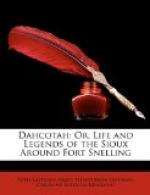But she resented the importunity of the hunter whose pretensions her parents favored. How often she had told him she would die before she would become his wife; and he would smile, as if he had but little faith in the words of a woman. Now he should see that her hatred to him was not assumed; and she would die such a death that he might know that she feared neither him nor a death of agony.
And while her parents mourned their unkindness, her lover would admire that firmness which made death more welcome than the triumph of his rival.
And sacred is the spot where the devoted girl closed her earthly sorrows. Spirits are ever hovering near the scene. The laugh of the Dahcotah is checked when his canoe glides near the spot. He points to the bluff, and as the shades of evening are throwing dimness and a mystery around the beauty of the lake, and of the mountains, he fancies he can see the arms of the girl as she tosses them wildly in the air. Some have averred they heard her voice as she called to the spirits of the rock, and ever will the traveller, as he passes the bluff, admire the wondrous beauty of the picture, and remember the story of the lover’s leap.
There is a tradition among the Dahcotahs which fixes a date to the incident, as well as to the death of the rival lovers of Wenona.
They say that it occurred about the time stated, and that the band of Indians went and obtained the porcupines, and then they returned and settled on the St. Croix river.
Shortly after the tragical death of Wenona, the band went again down the Mississippi, and they camped at what they call the medicine wood. Here a child died, and the body was laid on a scaffold. The father in the middle of the night went out to mourn for his child. While he leant against the scaffold weeping, he saw a man watching him. The stranger did not appear to be a Dahcotah, and the mourner was alarmed, and returned to the camp. In the morning he told the Indians of the circumstance, and they raised the camp and went into the pine country.
The body of the child was carried along, and in he night the father went out again to lament its death. The same figure appeared to him, and again he returned, alarmed at the circumstance.
In the morning the Indians moved their camp again, and at night the same occurrence took place.
The Dahcotahs are slaves to superstition, and they now dreaded a serious evil. Their fears were not confirmed in the way they anticipated, for their foes came bodily, and when daylight appeared, one thousand Chippeway warriors appeared before them, and the shrill whistle and terrible whoop of war was heard in earnest.
Dreadful were the shouts of the Chippeways, for the Dahcotahs were totally unprepared for them, and many were laid low at the first discharge of the rifles.
The merciless Chippeways continued the work of death. The women and children fled to their canoes, but the Chippeways were too quick for them; and they only entered their canoes to meet as certain a fate as those who remained.




